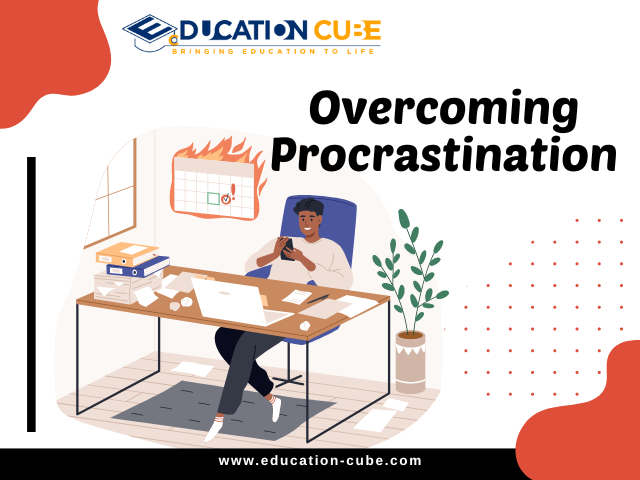
Overcoming Procrastination: 7 Strategies for College Students
. Procrastination is the arch-nemesis of productivity and can derail even the most ambitious college student’s academic pursuits. However, with the right strategies, it's possible to overcome this formidable foe and unlock your full potential. Here are seven effective tactics to help college students.
1. Setting Realistic Deadlines: Setting realistic deadlines is a powerful strategy for overcoming procrastination because it provides structure, accountability, and motivation to complete tasks promptly. It imposes a sense of urgency on tasks, prompting individuals to prioritize and take action. When individuals set deadlines for themselves, they create a sense of accountability for being forced to asses the requirements to complete tasks accurately. This encourages the development of time management skills as individuals learn to allocate their time effectively. Prioritizing tasks helps combat procrastination by providing clarity on what needs immediate attention, and fostering proactive action based on their importance and deadlines.
2. Breaking Tasks into Manageable Steps: Breaking tasks into smaller steps, reduces overwhelm, clarifies focus, and promotes consistent progress. Each completed step fosters a sense of accomplishment, motivating further action. Individuals are less likely to succumb to procrastination inertia and resistance by making tasks more approachable and manageable. This method encourages flexibility in task execution, empowering individuals to adapt and prioritize effectively. Overall, breaking tasks into smaller and manageable steps combats procrastination by fostering momentum, maintaining motivation, and ensuring steady progress toward goals.
3. Cultivating Self-Discipline: Cultivating Self-discipline cultivates the habit of consistency and accountability and accountability, reducing the temptation of procrastinating. By fostering a mindset of commitment and perseverance, individuals prioritize tasks effectively, overcome distractions, and stay focused on their goals. Self-discipline empowers individuals to take proactive action, mitigating the tendency to delay tasks unnecessarily.
4. Seeking Accountability and Support: Seeking accountability and support from peers or mentors provides motivation and encouragement to stay on track with goals, reducing the temptation to procrastinate. Regular check-ins, shared progress and mutual encouragement create a sense of accountability, fostering commitment and diligence in overcoming procrastination.
5. Minimizing Distractions: Minimizing Distractions is vital for combating procrastination by creating a conducive environment for focus and productivity. By eliminating sources of interruption, such as social media, notifications, and noise, individuals can maintain concentration on tasks, reduce the temptation to procrastinate, and increase their efficiency in achieving goals.
6. Using Productivity Tools: In the 21st century productivity tools have become essential for managing tasks, schedules, and projects efficiently. It offers features like a task list, reminders, and progress tracking, aiding in organization and time management. By providing structure and accountability, they reduce the likelihood of procrastination. These tools streamline workflows, minimize distractions, and encourage focus, promoting efficiency and goal attainment. Ultimately, productivity tools empower individuals to prioritize tasks effectively and stay on track with their objectives, combatting procrastination effectively.
7. Rewarding Progress: It provides positive reinforcement for tasks completed, motivating continued action and reducing the urge to procrastinate. Celebrating milestones and accomplishments fosters a sense of achievement and fulfillment, reinforcing productive behaviors and encouraging consistent effort toward goals ultimately avoiding procrastinating tendencies.
Overcoming procrastination is essential for college students to achieve academic success and personal growth. Implementing strategies such as setting deadlines, breaking time into manageable steps, minimizing distractions, seeking accountability, rewarding progress, and using productivity tools can overcome the challenges of procrastination and unlock their full potential. With determination, resilience, and support, students can cultivate the habits of productivity and discipline that will serve them well beyond their college years.
 Global Pharmacy Programs: Elevate Your Career with World-Class Education and Practical Exposure
Global Pharmacy Programs: Elevate Your Career with World-Class Education and Practical Exposure
 Artificial Intelligence (AI) and Machine Learning (ML) Careers: Building the Future of Innovation
Artificial Intelligence (AI) and Machine Learning (ML) Careers: Building the Future of Innovation
 Beyond Rankings: How to Choose the Right Country and University for Higher Studies
Beyond Rankings: How to Choose the Right Country and University for Higher Studies
 Study Cloud Computing Abroad: Destinations, Courses, Careers & Trends for 2025
Study Cloud Computing Abroad: Destinations, Courses, Careers & Trends for 2025
 Choosing the Right Stream After Class 10: A Comprehensive Guide for Students
Choosing the Right Stream After Class 10: A Comprehensive Guide for Students
 IELTS Exam Guide 2025: Expert Tips, Preparation Strategies & Best Practices for International Students
IELTS Exam Guide 2025: Expert Tips, Preparation Strategies & Best Practices for International Students
 A Comprehensive Guide to Writing a Letter of Intent for Higher Education
A Comprehensive Guide to Writing a Letter of Intent for Higher Education
 Study in France: A Comprehensive Guide for International Students
Study in France: A Comprehensive Guide for International Students
 International Relations & Political Science: Studying Global Affairs Abroad
International Relations & Political Science: Studying Global Affairs Abroad
 Study in Russia: A Complete Guide for International Students
Study in Russia: A Complete Guide for International Students
00 Comments
Leave a Comment